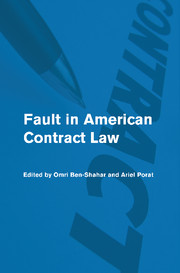Book contents
- Frontmatter
- Contents
- List of Contributors
- Preface
- Acknowledgment
- I THE CASE FOR STRICT LIABILITY
- 1 Let Us Never Blame a Contract Breaker
- 2 In (Partial) Defense of Strict Liability in Contract
- 3 The Fault Principle as the Chameleon of Contract Law: A Market Function Approach
- II THE CASE FOR FAULT
- III BETWEEN STRICT LIABILITY AND FAULT
- IV WILLFUL BREACH
- V COMPARATIVE FAULT
- VI THE MORALITY OF BREACH
- Case Index
- Subject Index
- References
1 - Let Us Never Blame a Contract Breaker
Published online by Cambridge University Press: 10 November 2010
- Frontmatter
- Contents
- List of Contributors
- Preface
- Acknowledgment
- I THE CASE FOR STRICT LIABILITY
- 1 Let Us Never Blame a Contract Breaker
- 2 In (Partial) Defense of Strict Liability in Contract
- 3 The Fault Principle as the Chameleon of Contract Law: A Market Function Approach
- II THE CASE FOR FAULT
- III BETWEEN STRICT LIABILITY AND FAULT
- IV WILLFUL BREACH
- V COMPARATIVE FAULT
- VI THE MORALITY OF BREACH
- Case Index
- Subject Index
- References
Summary
Holmes famously proposed a “no-fault” theory of contract law: A contract is an option to perform or pay, and a “breach” is therefore not a wrongful act but merely triggers the duty to pay liquidated or other damages. This chapter elaborates the Holmesian theory, arguing that fault terminology in contract law, such as “good faith,” should be given pragmatic economic interpretations, rather than be conceived of in moral terms. It further argues that contract doctrines should normally be alterable only on the basis of empirical investigations.
My thesis is that concepts of fault or blame, at least when understood in moral terms rather than translated into economic or other practical terms, are not useful addenda to the doctrines of contract law. I have borrowed this thesis from Holmes, who in The Common Law (and later in The Path of the Law) drew a sharp distinction between tort and contract law, so far as issues of fault or blameworthiness are concerned. In the case of an accident giving rise to a tort suit, he thought the loss should lie where it fell, that is, on the victim, unless the injurer was at fault, that is, negligent, and the victim faultless, that is, not contributorily negligent. He thus disapproved, in general, of strict tort liability. But a complication in his analysis arose from his belief in “objective” standards of liability; negligence was the failure of the average person to take proper care, even if the defendant was below average in his ability to do so.
- Type
- Chapter
- Information
- Fault in American Contract Law , pp. 3 - 19Publisher: Cambridge University PressPrint publication year: 2010
References
- 8
- Cited by



